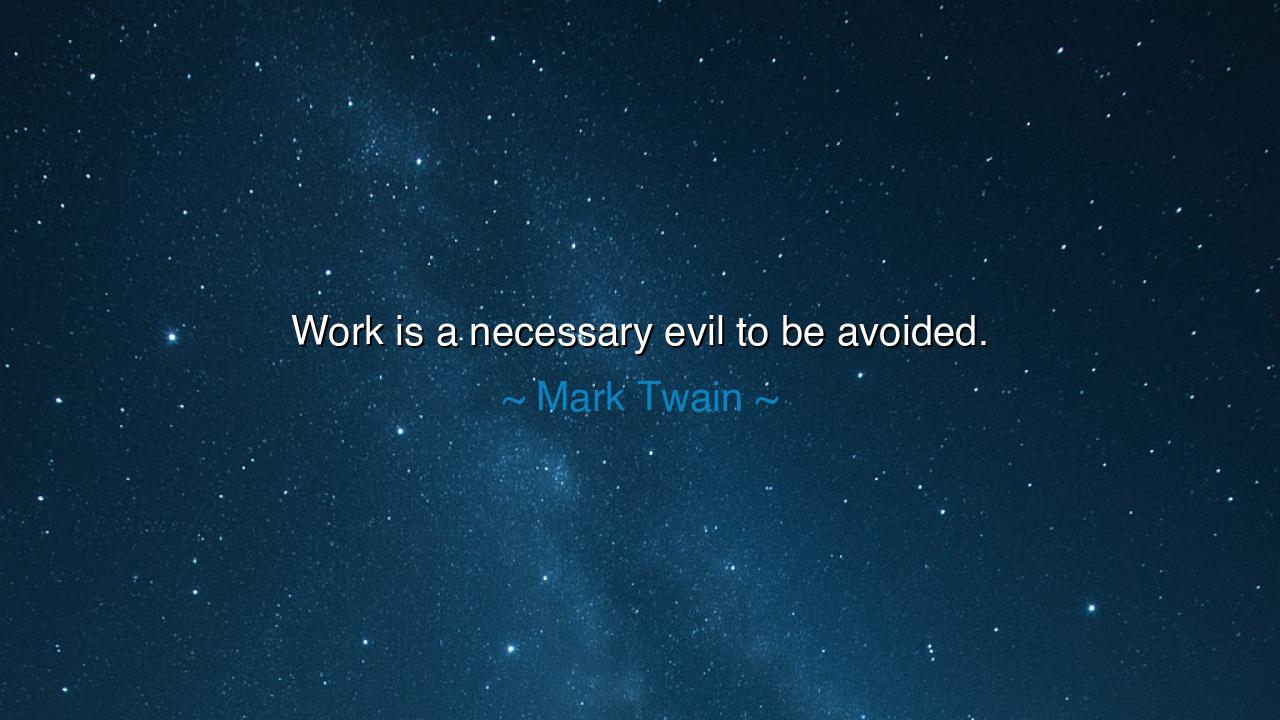
Work is a necessary evil to be avoided.






Mark Twain, the great humorist and philosopher clothed in wit, once said: “Work is a necessary evil to be avoided.” Though delivered in jest, the words carry the weight of human longing—that while work sustains life, it often feels like a burden pressing upon the shoulders of mortals. To call it a “necessary evil” is to confess its double nature: unavoidable for survival, yet resented by the spirit that yearns for freedom, leisure, and joy.
The ancients, too, wrestled with this truth. The Greeks told of Sisyphus, condemned to push his stone eternally, a symbol of endless and fruitless labor. Many cultures viewed toil as punishment, a mark of man’s fall from paradise, where life was once ease and abundance. Yet even in these myths lies acknowledgment that work is bound to our condition: without it, the field lies barren, the fire grows cold, and the body starves.
Twain’s sharpness lies not only in complaint, but in his laughter. By mocking work, he unveils the universal truth that people strive not for labor itself, but for what lies beyond it: rest, joy, and the freedom to live by choice, not compulsion. His words echo the heart’s rebellion against drudgery, the protest of the soul against days consumed by duty that does not nourish it.
Yet even within this jest, wisdom shines. To say work should be avoided is not to deny all effort, but to remind us to seek balance. Not all labor is equal: the work that crushes the spirit is indeed an evil, while the work that aligns with passion can feel like blessing. Twain’s quip exposes the folly of endless toil for its own sake, urging us instead to seek freedom, creativity, and joy wherever possible.
Let the generations remember: while work may be necessary, let it not consume the whole of life. Laugh at it, as Twain did, and resist the chains of labor that steal the soul’s song. For though toil sustains the body, it is leisure, laughter, and love that sustain the spirit. Thus, the wisdom of the ancients and the wit of Twain unite: embrace what must be done, but never let it enslave the heart.






Hhanh
Mark Twain’s quote about work seems to reflect a deep frustration many feel with the monotony or demands of daily labor. But is it possible that his view comes from a place of exaggeration or sarcasm? Could he be challenging us to rethink what we consider 'necessary' in our lives and whether our work truly adds value to our existence?
YCnguyen vu yen chi
It's interesting how Twain frames work as an evil to be avoided, but does this not imply a negative outlook on productivity and achievement? If we avoid work, do we miss opportunities for personal growth and accomplishment? How would our society function if we all shared this perspective and decided to avoid work altogether?
UGUser Google
Mark Twain’s quote strikes me as quite cynical, but I wonder if it was meant more as a critique of the societal pressures around work. Could it be that Twain was pointing out how work often becomes something we endure rather than something we enjoy? Does our culture place too much emphasis on work, even at the expense of personal happiness?
MTNguyen Le Minh Tho
I find Twain's view somewhat harsh, as work can often bring meaning to life, provide financial security, and help individuals grow personally. However, I do get the sense that it reflects the dissatisfaction some people feel in their work environment. Is it possible that his quote reflects more about the quality of the work we do rather than the concept of work itself?
AHtran anh hong
While I can understand Twain's sentiment, I wonder if work could be viewed as more than just a 'necessary evil.' Isn't it true that many people find fulfillment in their jobs, especially if they are passionate about what they do? How does one reconcile the need for work with the desire to avoid it? Should we not try to find work that we truly love instead?